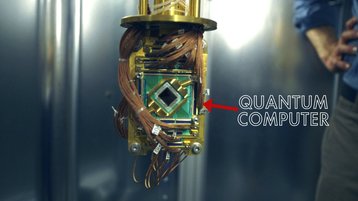Volkswagen has entered into a research partnership with Google to use one of its universal quantum computers.
The car company aims to use the experimental computing platform to explore traffic optimization, research new materials, with high performance batteries in particular, and artificial intelligence with new machine learning processes.
Just don’t mention Waymo
“Volkswagen has enormous expertise in solving important, real-world engineering problems, and it is an honor for us to collaborate on how quantum computing may be able to make a difference in the automotive industry,” Hartmut Neven, director of the Google Quantum Artificial Intelligence Laboratory, said.
Abdallah Shanti, Volkswagen’s EVP and group chief information and digital officer for Americas, added: “Volkswagen’s collaboration with Google marks the beginning of quantum computing in the automotive industry, and is a paramount step to addressing modern mobility challenges unlikely to be solved with binary digital electronic computers.
“Through this partnership, Volkswagen intends to unlock the potential of this technology, and share our learnings to motivate the development of quantum computers and algorithms.”
The collaboration is not the car company’s first foray into quantum computing - this March, Volkswagen turned to D-Wave to use the Canadian company’s quantum annealing computer to calculate traffic flow for 10,000 taxis in Beijing.
Google’s quantum computer, of which little is officially public, is more complicated than an annealing system. Dr Dominic Walliman, applications engineer for D-Wave, explained the difference in 2015: “In quantum annealing, what you’re trying to do is harness the natural evolution of quantum states, although you don’t have any control over that evolution.
“You set up the problem at the beginning and you let quantum physics do it’s natural evolution - and the configuration at the end corresponds to the answer you are trying to find.
“In gate model quantum computing, the aim is a lot more ambitious. What you’re trying to do there is to try to be able to control and manipulate the evolution of that quantum state over time. Now this is a lot more difficult because quantum systems tend to be incredibly delicate to work with, however having that amount of control means you can solve a bigger class of problems.”
Google was previously rumored to be releasing a 50 qubit universal quantum computer by the end of this year, with internal slides suggesting it will offer access to the machine on Google Cloud.
Bloomberg, which saw those slides, reports that the company formed a new internal lab it calls an “Embryonic quantum data center.” Jonathan DuBois, a scientist at Lawrence Livermore National Laboratory, told the publication that Google staff have been clear about plans to open up quantum service on cloud, and have pledged that US government and academic researchers will get free access.

